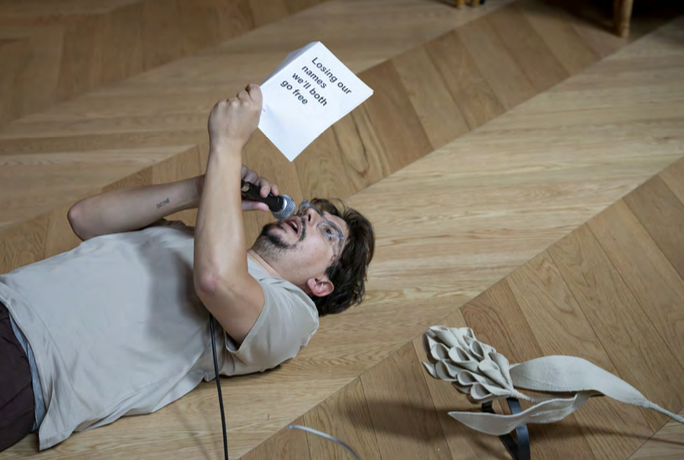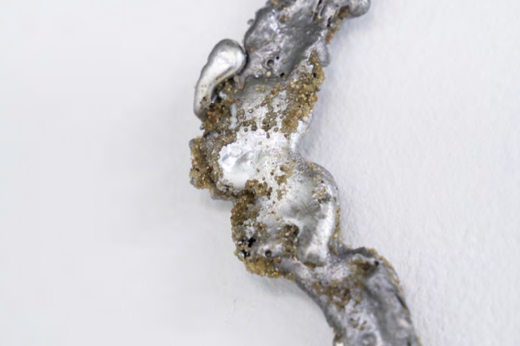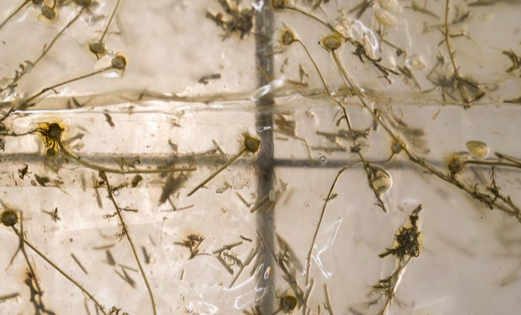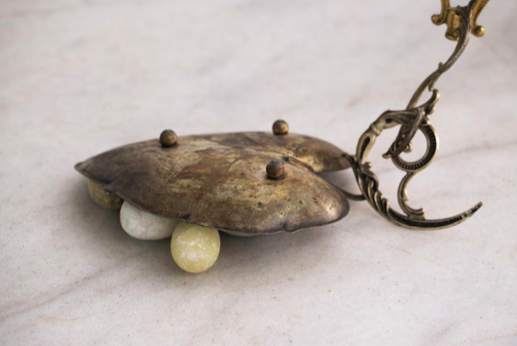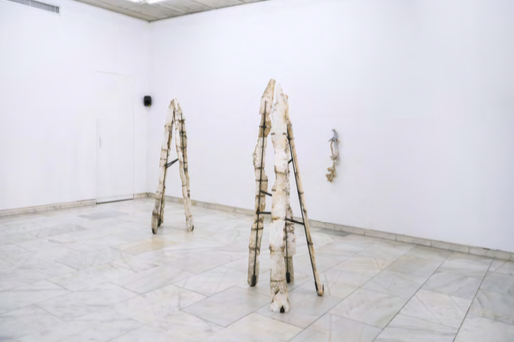YC
RP
FS
RR
Young Curators Residency Programme
Since 2020, Fondazione Sandretto Re Rebaudengo promotes the Young Curators Residency Programme Madrid. The project aims to support emerging curatorial practice while spreading knowledge of the Spanish art scene on an international level. The YCRP Madrid stems from the experience of the Young Curators Residency Programme Torino, that takes place every year in Italy since 2007.
Young Curators Residency Programme 2023 Curated by hablarenarte
Sala Anselma (Ateneo de Madrid): Calle del Prado 19 8.06.2023 - 6.07.2023
Desengaño
Desengaño is a Spanish word lacking a direct, one-word equivalent in English. It points to a state of disillusionment where one finds the ability to control one’s hopes and fears, by overcoming deceitful appearances and vanity. Departing from the idea of the Spanish baroque writer Baltasar Gracián, it encourages us to seek a form of enlightenment, an awareness of our own surroundings, but also the in-between areas of society at large.
In El Criticón(1) Gracián takes us to desengaño through the discourse of the two opposing characters Critilo (the man of reason) and Andreino (the man of nature). The dialogue between the two protagonists paints a satirical picture of society specific to Gracián’s present; the hypocrisy of the Spanish State, the church and the monarchy, but within this play on words we also find timeless critique: our neglect of nature, egoism, and the immense class differences that seem inevitable in any society. Revealed to us is a vital pessimistic approach that resonates now, just as much, if not even more than 17th century Spain. In a time where we are constantly faced with crisis, we find ourselves in a place of disappointment and fatigue; where do we even begin if we are to mend this detrimental system?
Just as the conversations between Critilo and Andreino, the works presented in Desengaño engage in an exchange of thoughts that extend beyond interpersonal relationships. Exhausted by excess and violence inherent in class, nature or language, the invited artists twist symbols of power through materialities that they decompose, merge or temporarily capture.Their process is timid, slow, and silent, and serves as a contrast to common (mis)conceptions of progress and growth. When faced with a bleak future, we might not aim forward but shift our focus towards other directions. Is it possible to move backwards without regressing?
Starting from small yet significant gestures, the works of the six invited artists all embody a will to (re)vitalise vernacular stories and narratives related to materialities. We delve into different crevices, tangible absences that speak of neglected or peripheral areas of knowledge production. What we encounter is robust but fragile, just as the materials of the works of the exhibition – from rosin, that can survive a million years, to espejuelo (specular stone) that despite its appearance will crack under gentle pressure.
In their works, Mónica Mays and Víctor Santamarina embrace cracks and decompositions as tactical tools. They both use discarded domestic objects, silent witnesses of class and decadent social rituals, turned into shape shifting hybrids. Retracing histories that affirm places of absence is equally relevant to the works of Sergio Pradana and Paula García-Masedo. Here, materials specific to areas near Madrid are transformed by intimate gestures of foraging and accumulating as a way to revisit childhood landscapes, marked by the passage of time. Similarly, an awareness but also reconsideration of our relationship with the natural realm is specific to the practice of Gabriel Alonso. His work aims to demystify and emancipate the natural world from the connotations given by humans through language. This interest is shared by Álvaro Chior, who questions linguistic excess and constant textualization of life, bypassing one-directional storytelling. He redirects our focus towards whispers, soft and slippery sounds that liberate desires.
Collectively, the works in the exhibition offer a polyphony directed towards given truths, while remaining attentive to their porous nature. In this manner they, like Gracian’s novel, offer us a detour, or a retour, an invitation to think beyond the immediate; not only criticize the unfairness we perceive, but also to affirm the potentiality of uncertainty.
(1) El Criticón is a Spanish novel by Baltasar Gracián. It was published in three parts in the years 1651, 1653 and 1657. The novel was written during his later years and contains his ultimate vision of the world and human life. Its worldview is pessimistic and desolate, although the two virtuous protagonists represent hope. At first glance an adventurous travel novel, the story takes us from the Island of St. Helena, to Spain, France, Rome, and eventually the Island of Immortality, all the while centering around not the places the two characters visit but their allegorical conversation on contemporary issues and the human experience at large.
Curators
Lovro Japundžić
Lovro Japundžić is a curator and producer based in Zagreb, Croatia. He currently works as a co-director at Miroslav Kraljevic Gallery (GMK), an independent and non-profit art platform and gallery. Since 2019 he’s been working at Mocvara Gallery doing site-specific installations and performances which combine playful and often confrontational approach towards normative structures. He is part of the curatorial collective that runs the international photography festival Organ Vida, mainly focused on image – its production, circulation, and consumption, heavily influenced by digital turnover. In 2018/2019 he participated as a curator in Parallel – European platform for contemporary photography. In 2021/2022 he was part of CuratorLab 2021/2022 at Konstfack, University of Arts, Crafts and Design. Between 2013-2019 he worked as a program selector of the Association for the Promotion of Independent Music Culture – Ziva Muzika, active in promoting innovative approaches to club music.
Una Mathiesen Gjerde
Una Mathiesen Gjerde is a producer, editor, and curator based in Oslo, Norway. Her research interests and curatorial work is centred around question relating to precariousness, work ethics, and social strategies for togetherness. She has curated exhibitions for institutions such as SALT (Oslo, NO), Studio 17 (Stavanger, NO), Telemark kunstsenter (Skien, NO), and K4 (Oslo, NO), and is currently the director of the artist association and exhibition space BO, The Association of Visual Artists Oslo. Mathiesen Gjerde is a co-founder of the digital art and curatorial network Ergi, and has previously held the position as Head of Production at Fotogalleriet (Oslo, NO), under the directorship of Dr. Antonio Cataldo. She holds an MA in art history from the University of Copenhagen and a BA in cultural entrepreneurship from Uppsala University. Mathiesen Gjerde was a part of CuratorLab 2021/2022 at Konstfack, University of Arts, Crafts and Design.
Mijoo Park
Mijoo Park is an independent curator and researcher based in Seoul, South Korea. She’s been organizing the discursive platform the Bul-teok. Previously she managed the RAT school of ART, a self-directed artist-run school (2014-2021). Her main curatorial practice investigates modes of institutionality and the roles of different organizations in sustainable artistic practices.
She curated exhibitions and projects including Endless Summer (2020-2021, Seoul and Jeju), Neither Dark Nor Black (Weekend, Seoul, 2020), Anyang Public Art Project (APAP6, Anyang/assistant curator, 2019), Omni-presence (ONE AND J. +1, Seoul, 2018), and Wishy-washy Bodies (Centre A, Vancouver, 2017) and work as associate curator for Frequencies of Tradition (Incheon Art Platform, 2021- 2022), and grandmothers (Post Territory Ujeongguk, Seoul, 2022). She participated in the 7th Gwangju Biennale International Curator Course (2016), Salzburg Summer Academy (2017), ARKO Creative Academy for Curator (2017), and Mountain School of Arts (2019).
Coordinator
hablarenarte
Written in lower case and in constant mutation, hablarenarte is a non-profit organization based in Madrid that has been working since 2002 in the field of cultural mediation, artistic education, expanded curating and contemporary creation.
Emma Brasó is a curator at the contemporary creation team of hablarenarte and Visiting Lecturer at the Fine Arts Department of the Universidad Complutense de Madrid. She holds a PhD from Royal College of Art (London) based on her research on the intersection of fiction and authorship since the 1980s. Before that, she obtained a master’s degree in Curatorial Studies at Columbia University (New York) with a grant from ‘la Caixa’ Foundation.
Artists
- Gabriel Alonso
Gabriel Alonso (b. 1986, Madrid) is an artist, living and working in the city of Madrid, formed between the ETSAM (Madrid), the Technische Universität (Berlin), and Columbia University in New York at the MS-CCCP, where he graduated with honors. In his works, through various formats such as installation, sculpture, photography, and video, he investigates the contemporary relations between fiction and materiality, to blur the binomials between the real and the imagined, between the human and the artificial, and between the natural and the cultural.
Represented by Pradiauto Gallery (Madrid), his work has been exhibited in different galleries and international exhibitions, such as Can Felipa (Barcelona), Pradiauto (Madrid), Nordés Galería (Santiago de Compostela), CaixaForum (Barcelona), Centro- Centro 2022 (Madrid), Fundación Lacaixa 2022 (Barcelona), Matadero 2019 (Madrid), John Doe Gallery 2018 (New York), IIAF2018 (New York), Poor Media Leuven 2016 (Belgium), Espacio Las Aguas 2015 (Madrid), Mila Gallery 2014 (Berlin) among others.
![]()
Losing our names we’ll both go free - Gabriel Alonso [Photography: Benedetta Mascalchi] - Álvaro Chior
Álvaro Chior is an artist born in A Coruña who lives and works in Madrid. His practice combines disciplines as sculpture, sound, writing and filmmaking focusing on language and image, its articulations, its material qualities and its relations with corporeal and physical processes.
Chior’s work has been exhibited in art institutions such as Museo Nacional Centro de Arte Reina Sofía (Madrid), La Casa Encendida (Madrid), Sala de arte joven (Madrid), Sala Amadís Injuve (Madrid), Matadero (Madrid), CC Can Felipa (Barcelona), Fabra i Coats (Barcelona), DA2 Domus Artium 2002 (Salamanca), Las Cigarreras (Alicante), TEA Tenerife Espacio de las artes (Tenerife), Etopia: Center of Art and Technology (Zaragoza), as well as in other countries such as EE.UU, México, Italy and Scotland.
![]()
Un susurro lento - Álvaro Chior - Paula García-Masedo
Paula García-Masedo is an artist based between Barcelona and Madrid. Through her work she addresses the sensitive expression of materials, understanding matter as a situated element that is linked in genealogies and that exists immersed, conforming to specific aesthetics and ways of feeling and living.
García-Masedo’s work has been presented in CA2M (Madrid), Casa Encendida (Madrid), TEA (Santa Cruz de Tenerife), La Capella (Barcelona), CentroCentro (Madrid), Blueproject Foundation (Barcelona), Fabra i Coats (Barcelona), Batalla (Santa Cruz de Tenerife), Bapore Atelier (Balmaseda, Bizkaia), Centre Cívic Sant Andreu (Barcelona), Twin Gallery (Madrid), and Museo de Arte Contemporáneo (Madrid), among others. She co- founded Pols, which she also till co-directed 2022, a non-profit art space in València. García-Masedo has curated exhibitions at CentroCentro (Madrid), LIGA DF (Mexico City), Monoambiente (Buenos Aires), and the Professional Association of Architects in Madrid. SShe studied the Independent Studies Program at MACBA and Architecture at the Polytechnic University of Madrid. Aside from her artistic practice, she is a university professor and writer, and has published two books with Caniche editorial.
![]()
01/07/2021 – 20/07/2021 - Paula García-Masedo - Mónica Mays
Mónica Mays (b. Madrid, based in Amsterdam) enmeshes biography, historical archive and mythology to generate a body of sculptural work that considers materials and objects through their production and reproduction, searching for logics of meaning-making and identity under alienating systems of production and exchange.
Mays studied Cultural Anthropology in the University of New Orleans, graduated Cum Laude from l’École Supérieure des Arts Décoratifs in Strasbourg, and in 2017 received an MA from the Sandberg Instituut in Amsterdam. Recent exhibitions include Tallinn Art Hall (EE, 2022), La Casa Encendida (Madrid, 2022), Frascati Theater (Amsterdam, 2020), Centro Centro (Madrid, 2022), Kubus (Hannover, 2023), Blue Velvet Projects (Zurich, 2023) and Nosbaum Reding (Brussels / Luxembourg, 2022). Mónica has been an artist in residence at Rupert (Vilnius, 2020), Matadero (Madrid, 2021) and DOGO (Lichtensteig, 2022) and has been awarded the Amsterdam Fonds voor de Kunst Prize (2021), Mondriaan Fonds Young Artist Stipendium (2022), Generación 2022 Prize by Fundación Montemadrid, and Bilbao Arte Project Grant (2021).
![]()
Bucolic Gang - Mónica Mays - Sergio Pradana
Sergio Pradana (Tarancón, 1994) is a graduate in Audiovisual Studies from the Universidad Complutense of Madrid. He was awarded a scholarship by the Lens School of Visual Arts to pursue a Master’s degree in Project Creation.
His investigation unfolds through sculpture, image and drawing, serving as languages through which he constructs an imaginary realm centered around absence, landscape, and the productive activities that take place within a given territory. Pradana has showcased his work at various exhibitions, including DA2 Artium (Salamanca), Casabanchel (Madrid), and MAC Florencio de la Fuente (Cuenca), among others.
![]()
La luna se levanta - Sergio Pradana - Víctor Santamarina
Víctor Santamarina (b.1990, Madrid) is an artist who lives and works in Amsterdam. He has a MFA from the Piet Zwart Institute, Rotterdam. Santamarina’s practice is developed through material based processes, with an experimental and autonomist approach to the techniques and means of production. His work looks at the processes of exhaustion and transformation in our present time; focusing on their capability to bring forth an alternative system of value, norms, and desires.
Santamarina’s work has been exhibited in a number of solo and group exhibitions in galleries, museums and artist’s run spaces. A selection of them includes Museo Lope de Vega (Madrid), Labinac (Napoli), Luis Adelantado (Valencia), Mutter (Amsterdam), Jardin (Madrid), Marwan (Amsterdam), Pradiauto (Madrid), Tale of a Tub (Rotterdam), García Galería (Madrid), Joey Ramone (Rotterdam), CA2M(Madrid), and Can Felipa Arts Visuals (Barcelona).
Jury
Agustín Pérez Rubio
Art historian, professor and curator, Pérez Rubio co-curated (with Maria Berios, Lisette Lagnado and Renata Cervetto) the 11th Berlin Biennale (2020). Previously, he was curator of the Chilean Pavilion, 58th Venice Biennale (2019), and artistic director of the Museo de Arte Latinoamericano de Buenos Aires (MALBA) (2014–2018), where he developed a socio-political programme dedicated to female Latin American artists like Teresa Burga, Mirtha Dermisache, Claudia Andujar, Anne Marie Heinrich or Alicia Penalba. Earlier, he was chief curator and director of the Museo de Arte Contemporáneo de Castilla y León (MUSAC), Spain (2003–2013).
Currently an independent curator, Pérez Rubio has resolved to rethink decoloniality, both in the field of museums and in that of dissident sexual practices based on feminist and queer/cuir theory working with artists who create political discourse on gender issues.
Elvira Dyangani Ose
Elvira Dyangani Ose is Director of the Museu d’Art Contemporani de Barcelona. Previously, she was Director and Chief Curator of The Showroom in London, as well as Lecturer in Visual Cultures at Goldsmiths, University of London, and a member of the Thought Council, Fondazione Prada. She has previously been Curator of the Göteborg International Biennial of Contemporary Art; Curator of International Art at Tate Modern, London; Artistic Director of Rencontres Picha – Lubumbashi Biennial, Democratic Republic of the Congo; Curator of Contemporary Art at the Centro Andaluz de Arte Contemporáneo (CAAC), Seville; Senior Curator at Creative Time in New York; and Curator of Contemporary Art at the Centro Atlántico de Arte Moderno (CAAM) in Las Palmas, Gran Canaria.
ycrp.fsrr.org
©2026 Fondazione Sandretto Re Rebaudengo

